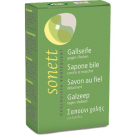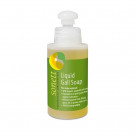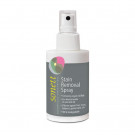Sonett

The basic principle behind Sonett is one of caring and being responsible for water - our main life force.
Sonett started producing natural washing and cleaning detergents in 1977. The inspiration for developing Sonett originated from research carried out by the scientist, Dr. Johannes Schnorr. During the late 1960's, Dr. Schnorr started using a method to determine the quality of water that was developed in Herrischried, Germany. This has become known as the Drop-image method.
With this method it became possible to explain more clearly the qualitative aspects of water as a carrier of life. It became clear through his work what damage synthetic detergents could do to water. Dr. Schnorr found undegraded detergents in the local drinking water. Sonett developed the concept of 'washing in a modular system' , with detergents that are completely biodegradable and which are used in as small an amount as possible.
Sonett has an Anthroposophical background, meaning that they work in harmony with nature. 'One can take from nature what one needs, as long as one does not abuse it.' They also make sure that what they put back into nature, is accepted by nature, enabling us to keep water clean. Because water is the carrier of all life on Earth.
Due to their concern for the renaturation of waste water, Sonett add balsamic substances to their washing powders and cleansers which have been rhythmatised in an oloide mixer, they also work with processed water which is vortexed in twelve egg-shaped glass vessels. These processes put life back into the water, before waste water is pumped back out into nature.
Sonett headquarters are in Deggenhausertal, near to Lake Constance. Sonett currently has 42 employees and its growing continuously. Sonett products are available in almost all European countries and approximately 90% of products are sold via the health food trade.
Biodegradable
- Sonett products are 100% biologically degradable and free of enzymes, synthetic fragrances, colourings, preservatives and genetically engineered raw materials
- In the manufacturing process of sugar surfactants and the sulphate from coconut oil, plant-based raw materials are used to extract starch, sugar and fat. The natural structure is maintained, making it easy for microorganisms to 100% decompose these products both quickly and completely.
- Soap made from vegetable oils combines immediately with the calcium present in the waste water to form calcium soap. Within a few hours, the surfactant effect, normally harmful to aquatic organisms, is neutralized. The calcium soap is then 100% degraded by microorganisms to carbon dioxide and water.
- Plant based ethanol mixes with water and is reintegrated into the natural cycle of the environement within a few hours.
Concentrated and Economical
- All the Sonett products are highly concentrated, making them very economical to use - a little goes a long way.
Free from all nasties!
- Sonett products are free from petrochemical ingredients, petrochemical or petrochemical based tensides, allergenic ingredients, phosphates and optical colour-brighteners.
- Sonett products contain no animal fats or other animal-based raw materials (apart from the cow gall that is used in the gall soaps).
Gentle on the Skin
- All Sonett products are particularly kind to the skin with only mineral and plant derived raw ingredients such as: Vegetable tensides (washing-active substances), pure natural Essential oils, plant derived alcohols, Citric acid (food quality), Soda, Silicates, Aluminates and Pumice powder being used.
- Sonett incorporates many raw materials which have been grown on Biodynamic or Organic farms, including: Palm fat, Olive, Rape Seed and Coconut oils and Essential oils of Lavender, Lemon grass, Citronella, Rose Geranium, Palmarosa, Mint and Clary Sage.
- A totally fragrance free range, known as the Neutral Range has been developed for allergy sufferers.
Environmentally Conscious
- Sonett try to be as conscious of the environment as possible; even their working environment.
- Electricity is sourced from a local water-driven generator and from Greenpeace Energy.
- Heating at Sonett and the local Camphill workshop at Lehenhof is fuelled from wood chips supplied by a local sawmill.
Socially Conscious
- As well as Sonett's care for the environment, the company also has a very strong social conscious.
- Camphill is a worldwide organisation of communities looking after people with special needs. Sonett's relationship with the Camphill community brings about social therapeutic work, with the people at Camphill doing most of the labelling for Sonett.
- The Sonett company is not privately owned; the not-for-profit Sonett Foundation is the sole owner of the company promoting not-for-profit initiatives such as in the field of water research, the development of alternative testing methods to animal experimentation and training in the field of research into formative forces.
Eco Certification
- Since 2005, the complete range of Sonett products has been certified according to the criteria of two eco-labels
- EcoGarantie - Sonett is the first washing powder manufacturer to receive this certification.
- EcoControl - an independent certification authority verifies that the Sonett Quality Criteria is fulfilled.
Animal Experimentation
Since 1998, animal experiments for the development of washing and cleaning agents and for caring cosmetics have been banned within Germany.
However, raw materials for cosmetics, washing agents, cleaning agents and other raw materials to be approved, their manufacturers are obliged, on the basis of the Chemicals and Hazardous Materials Ordinance, in addition to other national and EU regulations, to provide proof of the toxicological safety of these raw materials for humans and the environment, regardless of whether the materials are of petrochemical or natural origin, and irrespective of their subsequent field of application. Animal experiments for this purpose are imperative.
To date, only a few research verifications involving no animal experiments have been approved as safe and scientifically recognized alternatives. Furthermore, it is on the agenda that a new approval (REACH) must be applied for in the case of approx.130,000 "old chemicals", and this will involve comprehensive toxicological verifications and animal experimentation. Animal experiments are compulsorily prescribed for the approval of every new chemical raw material.
According to the German Society for the Prevention of Cruelty to Animals, there is no substance of which it could be said that it has never before been tested on animals – even with our commonest foodstuffs, water and salt, animal experiments have been performed. For this reason, there are also no cosmetics, no washing agents and no cleaning agents which involve absolutely no animal experimentation.
SONETT stipulates that animal experiments have never been performed in the development of any products, not even prior to 1998. Since 1998, this ban applies to all manufacturers of washing and cleaning agents equally, regardless of whether they manufacture in an environmentally friendly or conventional manner (in Germany, in all EU since 2010).
Ingredient Glossary
Olive Oil: The olive fruits come from century-old olive groves in the Mediterranean regions of Italy, Spain and Greece. By means of mechanical processes like pressing and centrifugation, the olive oil is extracted. When saponified with potassium hydroxide, it forms the main constituent of the Sonett Olive Washing Liquid for Wool and Silk. Olive oil is the best oil raw material for making mild soap and restoring the deficient protective hydrolipidic film. Its balanced fatty acid composition, curative balancing effect on the heart and circulatory system and the remarkable development of the olive tree on a 7-year cycle demonstrate the special proximity and relationship of this oil to humans.
Rape Seed Oil: Rape Seed Oil saponified with potassium hydroxide serves to increase the washing power. In addition to flax and sunflower, rapeseed is one of the few oil fruits which are cultivated for oil production in the temperate central European climate, also certified organically grown.
Ethanol: It is derived from the fermentation of starch-containing plants such as maize and potatoes. Ethanol helps to keep the soap liquid, while at the same time improving the fat-solubility of the detergent.
Sugar Sufactant: Sugar, starch and coconut oil are the raw materials for the sugar surfactant used. The proportion of the sugar surfactant is adjusted to the soap content of the detergent to ensure that the calcium soap formed by hard water is distributed as finely as possible and prevent it from being deposited on the laundry.
Sodium Percarbonate: the bleaching agent found in Sonett's Bleaching Complex, is a compound created from the absorption of hydrogen peroxide by sodium carbonate (soda). With heat (50°C +), the hydrogen peroxide is separated out again forming water and active oxygen. The optimal effect is achieved at a temperature of 95°C. The free oxygen the works on stubborn stains in two ways; by oxidizing the colouring matter and making it colourless and by making the stuck-on stain-causing substance water-soluble.
Sodium Percarbonate biodegrades during the washing and bleaching process itself into mineral soda, water and oxygen. When it leaves the washing machine there is no more degradation needed - it is already done, completely biodegraded!
Citric Acid: obtained from the fermentation of molasses. Due to its ability to form compounds with calcium carbonate, with the release of carbon dioxide, it is used in toilet cleaners to dissolve lime scale deposits. Being a constituent of plant, animal and human metabolisms it is easy for naturally occurring micro-organisms to rapidly and completely degrade it into carbon dioxide and water. Used in Sonett Toilet Cleaner.
PACKAGING MATERIALS: Mostly used Bottle/can: PE, Labels/cap: PE/PP
Polyethylene and polypropylene are 100 % recyclable and can be recycled together using a low energy process.
-

Sonett Gall Soap, 100g
Excl. VAT: €1.42 Incl. VAT: €1.70 -

Sonett Liquid Gall Soap, 300 ml
Excl. VAT: €3.50 Incl. VAT: €4.20 -

Sonett Stain Removal Spray, 100ml
Excl. VAT: €2.62 Incl. VAT: €3.15








